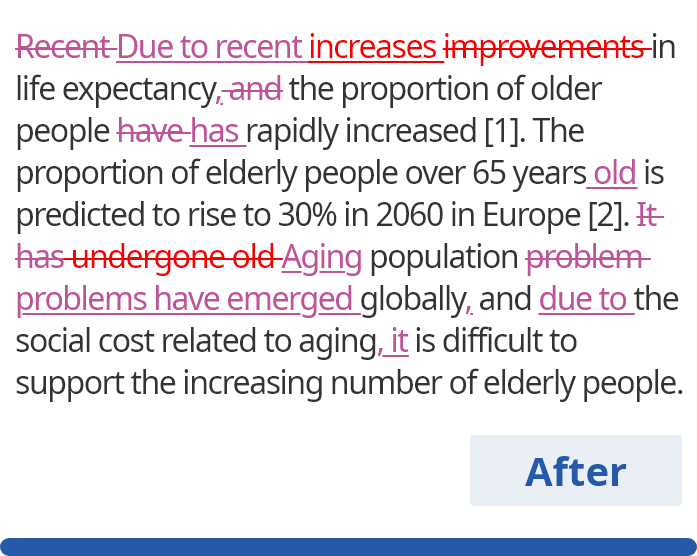接続詞を使う際のルール
接続詞は、単語、フレーズや節を結び付けるワードです。そのなかでも「and」「but」「or」は最もよく使われている接続詞です。
接続詞には次の3つの種類があります。
等位接続詞
従属接続詞
相関接続詞
接続詞の種類
| 接続詞の種類 | 接続詞の役割 | 接続詞の例 |
|---|---|---|
|
等位接続詞 |
文法的に同等な項目を接続する |
for, and, nor, but, or, yet, so |
|
従属接続詞 |
従属節を導入する |
because, if, although, since, until, and while |
|
相関接続詞 |
対になっていて、文法的に同等な要素を結び付ける |
either/or, neither/nor, not only/ but also |
目次
- 1.等位接続詞
- 2.従属接続詞
- 3.相関接続詞
- 4.接続詞で始まるセンテンス
- 5.カンマを接続詞と共に使うときのルール
等位接続詞
等位接続詞は、同等な価値または意味を持つ単語やフレーズ、節を結び付けます。「for」「and」「nor」「but」「or」「yet」「so」等がよく使われる等位接続詞です。上記7つの等位接続詞は、各語の頭文字の語呂合わせで「F.A.N.B.O.Y.S.」(for, and, nor, but, or, yet, soの順で)と覚えておくと便利でしょう。
- Example
- This study investigates the effects of Drug A and the placebo on the patients.
- Example
- You can choose to take the test or write an essay to pass the class.
2つの独立節を等位接続詞で結び付ける場合、その等位接続詞の前には必ずカンマを付けます。
- Example
- She was unhappy with the test results, yet she refused to take the test again.
- Example
- I have only been here for one week, so I know practically nothing.
- Incorrect
- You should invite Mary, and Jane to the party.
- Correct
- You should invite Mary and Jane to the party.
従属接続詞
従属接続詞は、従属節を主節に結びつけます。 因果関係、対比、時間や場所の変遷、条件関係などを表示する際に従属節が使えます。 「after」「although」「before」「even though」「if」「in case」「till」「whenever」「unless」「while」等が最もよく使われる従属接続詞です。
因果関係の表示
因果関係を示す従属接続詞には「because」「since」「as」「due to」 「as if」があります。
- Example
- I could not go to class because I did not feel good.
- Example
- Due to his poor attendance, the professor had to fail him.
対比を強調
対比を示す従属接続詞には「although」「though」「whether」「while」「even though」あります。
- Example
- While she plans to go to Paris for spring break, he plans to go to Tokyo.
- Example
- Although he is much younger than me, he is much smarter than most of my classmates.
条件関係を表す
条件関係を示す従属接続詞には「if」「unless」があります。
- Example
- Unless you leave now, you will be late.
- Example
- If he decides to take the offer, he will have to move out soon.
時間や場所の変遷を表す
時間や場所の変遷を示す従属接続詞には「where」「everywhere」「after」「until」「as soon as」「before」があります。
- Example
- Don't forget to clean your room as soon as you get home.
- Example
- This is the place where I grew up.
相関接続詞
相関接続詞は、センテンスの2つのパーツ、または相互関係にあるセンテンスを接続するために用いる一対の語です。「either/or」「neither/nor」「not only/but also」等がよく使われる相関接続詞です。
一般的に、センテンス中で一連の接続詞を使う場合、互いをカンマで区切る必要はありません。
- Incorrect
- I will either have a sandwich, or salad for lunch.
- Correct
- I will either have a sandwich or salad for lunch.
- Incorrect
- Neither the boy, nor his brother want to help their mother.
- Correct
- Neither the boy nor his brother want to help their mother.
ただし、例えば「not only/but also」のような相関接続詞を使って2つの独立節を区切る場合には、接続詞の前にカンマが必要になります。
- Incorrect
- Not only did she start playing the piano at a very young age but her mother also taught her to compose music.
- Correct
- Not only did she start playing the piano at a very young age, but her mother also taught her to compose music.
接続詞で始まるセンテンス
接続詞で始まるセンテンスは「文法的に正しくない」と一般的には言われています。しかし、接続詞から始めるセンテンスの使い過ぎは推奨できませんが(特にアカデミックライティングにおいては)、接続詞から始まるセンテンスも慎重かつ控えめに、または詩的効果をもたらす目的で使う限りは許容範囲内でしょう。
- Example
- She wanted to go home. But he did not want to.
- Example
- Although I do not like the restaurant, I will go if you want me to.
- Example
- Either this dress or that pair of pants is fine.
カンマを接続詞と共に使うときのルール
カンマを接続詞と共に使う際のルールは極めてシンプルで、これはどの種類の接続詞を使う場合であっても同じです。2つの独立節を結び付けるときに接続詞を使う場合、カンマは接続詞の前に付けます。
- Example
- The professor explained the assignment in detail, but the students did not seem to understand it.
- Example
- The weather is nice, but I don't think we should go on the picnic.
一方、独立節を従属節につなげるときに接続詞を用いる際にはカンマは必要ありません。
- Incorrect
- The professor explained the assignment in detail, and gave out the workbook.
- Correct
- The professor explained the assignment in detail and gave out the workbook.
- Incorrect
- The weather is nice, but a little bit chilly.
- Correct
- The weather is nice but a little bit chilly.
ただし、2つの独立節を結び付けるときのカンマの使用には1つ例外があります。接続詞によって結び付けられる2つの独立節がごく短いものである場合、接続詞の前にくるカンマを省略することができます。
- Incorrect
- I cooked, and he cleaned.
- Correct
- I cooked and he cleaned.
また、接続詞に関して、主節の前にくる前置き節、フレーズ、単語の後にはカンマを付けます。前置き語、または前置き節としてよく使われる接続詞には、「after」「although」「as」「if」「since」「when」「while」が含まれます。
- Example
- While I do my homework, you go do the dishes.
- Example
- If you do not want to go to the party, you can stay home.













